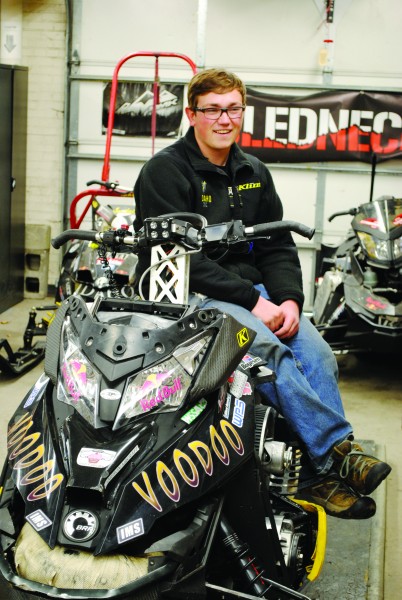At this year”s Society of Automotive Engineers International Collegiate Design Series competition in Houghton, Michigan, the University of Idaho Clean Snowmobile Challenge team accomplished what no team has done before – winning the Founder”s Trophy for two consecutive years.
The Founder”s Trophy is given to the team with the best sportsmanship during the weeklong competition. Junior captain and mechanical engineering major Mark Woodland said what makes the award so special is that all of the collegiate teams in attendance vote for the winning team.

Joleen Evans | Argonaut
Sophomore Zach Lipple shows off the clean snowmobile that went to competition.
“We always try to push for the Founder”s award,” Woodland said.
Teams from around the world attend the annual competition which took place March 7-12 to showcase snowmobiles they”ve worked on year-round to make cleaner, quieter and more fuel-efficient. Woodland said the team walked away from this year”s competition with a plethora of accolades, including Best Fuel Economy and Most Likely to be Manufactured.
Sophomore Zach Lipple, a mechanical engineering major and second-year member of the CSC team, said the Most Likely to be Manufactured award reflects what the UI team strives to accomplish with their snowmobile project. The UI team starts with a stock Ski-Doo snowmobile, and rather than completely redesigning the engine like many teams at the competition, they try to design components that people in the motor sports industry could realistically implement.
“It”s something simple, something effective and something efficient,” Lipple said in reference to a turbocharger the team designed that would cost no more than $10 to produce. “That”s something we aspire to do as a team – we try to make things that anyone could use. That”s kind of what the award means to us.”
The competition consists of a series of tests to determine each snowmobile”s performance in each category. Student team members do the testing themselves, including a handling course, a noise test and a 100-mile endurance run. Teams also produce technical papers and give presentations, as well as network with professionals.
“It”s kind of baffling,” Lipple said. “You”re surrounded by a bunch of engineers who have spent 10, 20, 40 years in industry, so they know what they”re doing. And to come in as someone who”s done two years of kind of engineering is mind-blowing.”
Lipple said he gave a presentation at this year”s competition to the man who designed a component of the stock snowmobile”s engine that made it run. Lipple”s job was to convince the man that what UI”s team did to alter the engine improved it.
“Trying to convince him that what we did to his already-perfect engine made it better was kind of a tough sell,” Lipple said.
Woodland said that this innovative work is important in the power sports industry due to increased government emissions regulations. He said that if these technological developments aren”t happening ahead of time, the industry will never meet these ever-changing standards.
“So by doing these kinds of projects and competitions, we”re helping industry come up with innovative ideas to keep the progression going,”
Woodland said.
Woodland said he had graduate students helping him learn the process during his underclassmen years, and he wanted to become the captain to return the favor to the program.
“It takes everything you learn in the classroom and it applies it,” Woodland said. “Coming in as a freshman, you can start getting hands-on experience right off the bat, where a lot of the time “¦ you don”t actually get into the machine shop or start designs until your senior year. I like being able to apply what I know, and get that fun experience.”
Woodland said that while class credit is offered for working on the CSC project, the time spent on the snowmobile surpasses class time, with some team members spending time on it over the summer. He has spent time building new worktables in the College of Engineering”s machine shop.
“What you want to put into it is what you”ll get out of it,” he said.
Lipple compared the team”s unique approach to the competition to the unique style of snowmobiling practiced in the west – less trail riding and more cross-country mountain riding.
“We don”t like staying on the beaten path, and I think that”s where out design comes from as a team, too,” Lipple said. “We like to do stuff outside the box. I think that”s what”s led us to be such a prosperous team in the past and I think that”s why we”re still around today.”
Lyndsie Kiebert can be reached at [email protected] or on Twitter @lyndsie_kiebert
